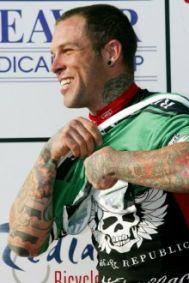 We never can pass up a good SoCal masters cycling doping story and this one is great because it’s everyone’s second time around. . . deja vu.
We never can pass up a good SoCal masters cycling doping story and this one is great because it’s everyone’s second time around. . . deja vu.
Back in 2007 Upland, California road racer Kayle LeoGrande, 40, was pinged for using EPO while racing in The Point Premium Root Beer International Cycling Classic. For this rule violation LeoGrande was given a two-year suspension.
Now, 10 years later, LeoGrande was tested following his win in the 35+ race at The 2017 Dana Point Grand Prix and according to the USA Cycling his urine ratted out a pharmacy of banned substances including: raloxifene, ostarine, ibutamoren, GW1516 sulfone, RAD140, LGD4033, and andarine. Because of this he was given an 8-year suspension. But hey, he’s only 40 and eight years gives him plenty of time to train for another national crit title in 2025, right? He can come back again, for sure.
For the official word from the USAC, follow the jump. For some unofficial coverage on the whole thing from Cycling The South Bay, click here. The later is far more entertaining, than the former.
USADA announced today that Kayle LeoGrande, of Upland, Calif., an athlete in the sport of cycling, has received an eight-year sanction for his second anti-doping rule violation after testing positive for seven prohibited substances. LeoGrande was selected to submit a sample as a result of being among the top finishers in his event at the 2017 Dana Point Grand Prix of Cycling in Dana Point, Calif.
LeoGrande was subject to testing because the event was sanctioned by USA Cycling, which maintains the RaceClean Program that works to fight doping at the amateur level of cycling. The goal of the RaceClean Program is to increase testing and education at the amateur level to provide greater doping deterrence, and this USA Cycling program is executed through member funding, donations, and local association partnerships.
LeoGrande, 40, tested positive for raloxifene, ostarine, ibutamoren, GW1516 sulfone, RAD140, LGD4033, and andarine as the result of an in‐competition urine sample he provided on April 30, 2017. Raloxifene and GW1516 sulfone, a metabolite of GW1516, are prohibited substances in the class of Hormone and Metabolic Modulators; ostarine, RAD140, LGD4033 and andarine, are prohibited substances in the class of Anabolic Agents; and ibutamoren is a prohibited substance in the class of Peptide Hormones, Growth Factors, Related Substances and Mimetics. These substances are prohibited at all times under the USADA Protocol for Olympic and Paralympic Movement Testing, the United States Olympic Committee National Anti-Doping Policies, and the International Cycling Union Anti-Doping Rules, all of which have adopted the World Anti-Doping Code and the World Anti-Doping Agency Prohibited List.
LeoGrande’s first anti-doping rule violation resulted from his use of the prohibited substance erythropoietin (EPO) while competing in The Point Premium Root Beer International Cycling Classic in 2007, which USADA established through witness testimony and other evidence presented during a multi-day hearing before a three-person, independent panel of arbitrators. At the conclusion of LeoGrande’s first period of ineligibility imposed by the arbitrators, he also admitted he had knowingly used EPO in violation of the rules. Following his most recent positive test from the Dana Point Grand Prix of Cycling, LeoGrande did not request a hearing to contest the charges against him.
LeoGrande’s eight-year period of ineligibility began on May 25, 2017, the date he accepted a provisional suspension. In addition, LeoGrande has been disqualified from all competitive results obtained on and subsequent to April 30, 2017, including forfeiture of any medals, points and prizes.
In an effort to aid athletes, as well as all support team members such as parents and coaches, in understanding the rules applicable to them, USADA provides comprehensive instruction on its website on the testing process and prohibited substances, how to obtain permission to use a necessary medication, and the risks and dangers of taking supplements as well as performance-enhancing and recreational drugs. In addition, USADA manages a drug reference hotline, Global Drug Reference Online (www.GlobalDRO.com), conducts educational sessions with National Governing Bodies and their athletes, and proactively distributes a multitude of educational materials, such as the Prohibited List, easy-reference wallet cards, periodic newsletters, and protocol and policy reference documentation.
USADA is responsible for the testing and results management process for athletes in the U.S. Olympic and Paralympic Movement, and is equally dedicated to preserving the integrity of sport through research initiatives and educational programs.